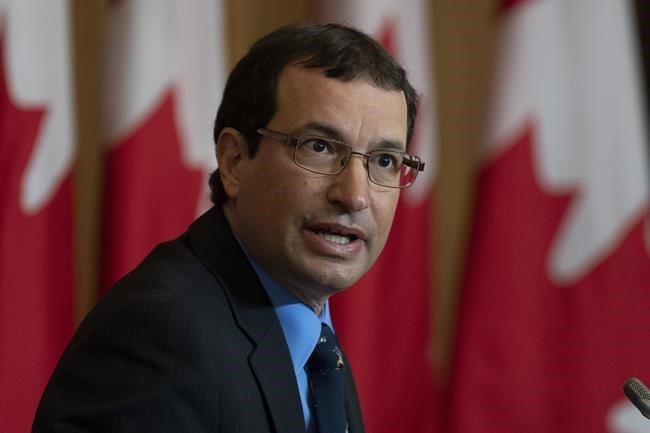OTTAWA — Two years ago, Canada embarked on an odyssey to plant two billion trees in just 10 years.
An audit of the program so far says the way things are now, it won't even get one-tenth of those trees in the ground in time.
"They are not on track," Jerry DeMarco, the federal environment commissioner, told reporters on Thursday.
But after a "slow start," he said, "it's still possible to catch up."
The audit was one of five reports he issued this week. DeMarco said he cannot stress enough how important it is for the government to live up to its commitment on trees, since forests are a big part of the solution to climate change.
He added that the government has been slow to meet many of its climate and biodiversity targets.
"Climate change and biodiversity are intrinsically linked and ... these two crises need to be addressed through decisive and concerted actions," he said at a press conference in Ottawa.
"It's clear that we have been repeatedly ringing the alarm bells. Now, these bells are almost deafening."
The Liberals first made the massive tree-planting promise during the 2019 federal election campaign, as part of their overall strategy to stop adding greenhouse gases to the atmosphere by mid-century.
They followed through a year later, earmarking $3.2 billion for tree planting in the 2020 fall economic statement.
DeMarco's office looked at how things went over the first two years. He concluded that the government isn't on track to get even four per cent of the promised trees in the ground by the end of 2030.
"It is unlikely that the two billion trees program will meet its objectives unless significant changes are made," the audit said.
The government aimed to get 30 million trees planted in 2021 and another 60 million in 2022, but it is already behind schedule for 45 million of them.
DeMarco said Ottawa came close to meeting its target the first year, planting about 96 per cent of the planned total.
The government hasn't yet published its final numbers for the 2022 planting season, and isn't expected to do so until June. But DeMarco said based on the number of signed agreements the government had in place to plant trees last year, he estimates only about 16.5 million trees would have been planted.
He said that for the long term, his audit found signed agreements to plant only 76.2 million trees by 2030, 3.8 per cent of the two-billion goal.
"They're off to a slow start," DeMarco told reporters, but "they are taking our report seriously and we'll see whether they follow that up with the necessary actions on the ground."
The federal government's website says that as of March, the program has signed or is in the midst of negotiating agreements that would plan 260 million of the promised total.
In a statement, Natural Resources Minister Jonathan Wilkinson said he is "fully committed" to implementing the plan.
"Many of the actions that the commissioner recommends we take are currently under way. We will double down on these efforts and we will move forward on new ones that are in line with his additional recommendations to further improve this program," Wilkinson said.
"We are working and learning in real time with experts from across the country."
Planting trees requires long-term planning, DeMarco said.
Nurseries have been clear that they need up to two years' notice to prepare to plant seedlings, and it can take anywhere from one to eight years before they are ready to go into the ground.
By 2027, Canada will need as many as 350 million seedlings a year, the audit said.
Ottawa isn't planning to plant most of the trees itself. Rather, it is funding partners, including provincial and territorial governments, Indigenous communities, cities and private landowners to do most of it. That requires signed agreements.
In 2022, there were 94 such agreements under negotiation, but by October, only 23 had actually been signed.
Wilkinson's statement said that since the time of the audit, six contribution agreements with provinces and territories and 50 agreements with other partners have been signed.
Still, DeMarco said looking ahead, the government needs to move faster on the long-term agreements with provinces and territories. Two-thirds of the trees to be planted are to come from those agreements.
Federal documents show by last fall, only Manitoba, Prince Edward Island, Northwest Territories and Yukon had signed agreements in principle. Nova Scotia, British Columbia and Alberta signed on over the winter.
The audit also found that while Canada initially said the program would eliminate two million tonnes of greenhouse-gas emissions annually by 2030, it now acknowledges that it's not going to start reducing emissions until at least 2031.
Trees act as natural carbon-capture systems, with a single mature tree able to take in and store about 22 kilograms of carbon dioxide over the course of a year. That is about what a passenger car produces for every nine litres of gasoline used.
Seedlings will take several years to get to that point, however.
The emissions associated with preparing sites for planting and doing the actual planting will exceed the emissions absorbed by the trees until after the planting is complete.
DeMarco said that in 2031, the trees will start to actually remove carbon dioxide from the atmosphere, but won't hit the two million tonnes promised until some time after 2038.
This report by The Canadian Press was first published April 20, 2023.
Mia Rabson, The Canadian Press



